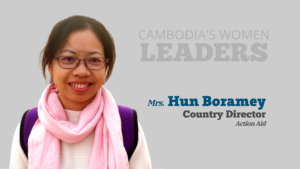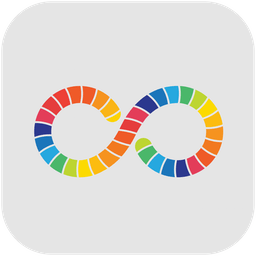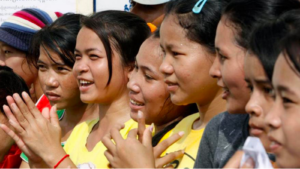
This is a single part of a series of stories of 21 women leaders of Cambodia. Download the full publication here.
Give a short introduction about your life (family, education, marital status) and how has your experience been as a leader and what achievements are you most proud of?
My name is Hun Boramey. I am currently the Country Director of ActionAid Cambodia. I was born in Battambang province. My parents moved to the capital, Phnom Penh, when I was three years old with the hope that I and my siblings would get some education. I have two sisters and four brothers. I am the second eldest, and married with one son. When I think about my education, I always think fondly of my time at Toul Kork Primary School where I happily enjoyed my early years of schooling before going on to Indradevy High School for my secondary and high school education. I am a proud Institute of Foreign Languages graduate in 2001. In 2005, I completed my Master’s Degree in International Affairs at Ohio University in the United States. In 2012, I was awarded an Executive Award under the Australian Government’s Endeavor Award Programme to work with the Australian Human Rights Commission in Sydney for three months.
In 2016, I was appointed the Country Director of ActionAid Cambodia which rather took me by surprise. I had never envisaged taking on such a high and demanding role, and it has been quite a journey. Senior positions come with a lot of responsibility, but I was fortunate to have a strong team that is highly committed, dedicated, technically sound and passionate about the organization’s vision, mission and goal. It was their confidence, trust and support in me that enabled me to undertake the role. One of the things I am proudest about is being able to contribute to supporting the struggles that community members, particularly women and children, face and see them overcome injustice bringing with it positive changes in their lives and that of their whole community. It is the people we work with and for that keeps my motivation alive. I also have to acknowledge and thank my family and in particular my mother who has continued to teach me, coach me and support me through all the good and tough times I have faced throughout my life.
The challenges built up my experience and confidence which led me to where I am today.
When you first started out with your career, what were your most significant challenges?
I think I had to really prove that I am a leader who is mindful, selfless and compassionate. I was involved in so many decisions on a daily basis, and I always had to keep asking myself if those decisions were the right ones. Did I do it the right way? For the right purpose? Above all, did I use my power rightfully?
My other challenge has been the need for me to always make a conscious effort to speak up and prove myself and to show that it is possible to be a leader of an International Non Governmental Organisation (INGO) despite my gender, my age and also my ethnicity. It has been a constant challenge to be taken seriously.
Over the years, what valuable lessons have you learned as a leader?
Love yourself. Self-love is not selfishness. If you cannot take care of yourself you cannot take care of others. Self-love is love for others. When you take good care of yourself, you become a healthy leader. A healthy leader creates a healthy team. A healthy team creates a healthy organization. A healthy organization will no doubt succeed in delivering its mission. This is easier said than done. I am learning every day.
What are your core values and how do you ensure your team is aligned with your values?
Working with ActionAid, I hold deep in my heart the values and principles of the organization. Four of the values include humility, mutual respect, equity and justice and courage of conviction.
Humility should be present in our behavior and we should recognize that we are part of a wider alliance against poverty and social injustice. We should not claim credit on our own. Mutual respect requires us to recognize the innate worth of all people. Particularly, we are committed to serving people who live in poverty and exclusion, and we value diversity. Equity and justice require us to work to ensure equal opportunity for everyone, irrespective of race, age, gender, sexual orientation, HIV status, ethnicity, disability, location and religion. Courage of conviction requires us to clearly take sides, be creative and innovative without fear of failure – in pursuit of the greatest impact.
These values are embedded in our programme design, daily operations, our procedures and policies. With the rest of the senior management team members, we try to lead by example – to walk the talk. The decisions we make need to reflect these values both in personal and also in our professional lives.
What are some of the behaviors or traits that you think are negatively impacting leadership?
I just read a great book. The author reminded me that ego is an enemy of good leadership. We acquire more power as we move higher up the ladder of an organization. So, if we do not constantly take a step back and reflect, our ego can get the better of us if we fail to learn from our mistakes that lead us to make decisions that are harmful to ourselves, our team and the organization as a whole.
What are you doing to continue to excel as a leader (leadership tips in doing businesses and promoting women’s economic empowerment or gender equality)?
I am trying to take better care of my soul. Self-care is very important and something that I need to do more and better. Self-care is one of the core mental qualities that a leader needs to excel.
To promote the economic empowerment of women, the success indicators of it should not be just about how much women earn. It is not enough. It should also be the quality of life that a woman leads. In our experience working with women of different groups, we witness them taking the front line in claiming their rights, protecting their land and community’s natural resources, but they badly need self-care and love. I am hoping that I can do much more to support the women we work with to adopt these mental qualities. BUT I have to start with myself!
What are some of the biggest risks you’ve taken in your career and how did they turn out?
One of the risks was to choose to work in the development sector after I completed my Master’s Degree. Instead of selecting another field, I consciously chose to be in this sector, working with poor and excluded people, because I believe in a human rights-based approach. It has turned out well, despite the fact that I have not been able to change the world as I had envisaged when I was a fresh graduate. I think I have gained so much knowledge, self-consciousness and self-awareness through this work. Even though I still have a lot to learn, I am grateful for who I have become thanks to the choice I made back then.
Another risk I took was back in 2011 when I decided to change gears in my career – from being someone who manages fundraising portfolios to managing and leading a programme department. I was quite uncertain about the change. I had no confidence in myself and I was so cautious about how others saw me. Despite my lack of experience and lack of self-confidence, I took on the role and it turned out fine. As I look back, I think I made the right choice. The challenges built up my experience and confidence, which have led me to where I am today.
What makes Cambodian culture unique and how do you think Cambodia can thrive in this age of entrepreneurship & dynamic leadership.
Cambodian entrepreneurs really strive to promote their national product and identity. I think this deep-in-the heart push has really been a factor that has made entrepreneurship thrive in this country. They are not just looking to make a profit but also to produce things that would make the nation proud and address social issues at the same time. Some have even gone on to think about how they could contribute to addressing gender issues and place women’s empowerment at the heart of their businesses.
What advice do you have for young Cambodian female entrepreneurs?
“The success of your business should not only be about how much profit you make but how the profit you make, big or small, contributes to a fair and just society for all, especially for women and children.”
© Copyright 2019
This is a joint publication by Woomentum and Konrad Adenauer Stiftung. Download the full publication here.

